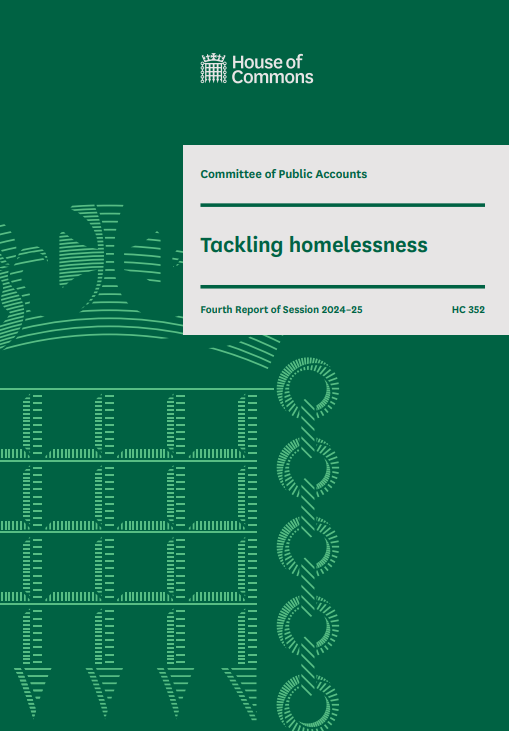Library Archive
CWAG Newsletter – July 2025
This Update includes the following

Comprehensive Spending Review
Social Housing is regarded as one of the winners from the Spending Review. Key issues for social housing were initially summarised in the Letter from Housing Minister to registered providers of social housing: Spending Review 2025 – GOV.UK.
Housing Headlines
- £39 billion for a 10-year successor programme to the Affordable Homes Programme to run from 2026/27 – 2035/36. The programme renames Social and Affordable Homes Programme (SAHP) will prioritise homes for social rent but will also include affordable rent and shared ownership. Reference to 2.5 billion for low interest loans to support new development with details yet to be announced.
- A 10-year rental settlement based on CPI + 1% each year from April 2026.
- The government has confirmed it will consult on a convergence mechanism to be confirmed at Autumn Budget. A consultation on implementation options will be published shortly.
- Social Landlords will be given equal access to the Building Safety Fund and Cladding Safety Scheme making it easier to fund building safety remediation through government schemes. This change is in response to concerns that building safety liabilities are holding back involvement in new supply projects.
- £100 million for early interventions to prevent homelessness through the Transformation Fund
- £950 million for a 4th round Local Authority Housing Fund (LAHF) enabling councils to acquire and refurbish properties to increase the supply of better-quality temporary accommodation.
See MHCLG Announcements below for further details.
Latest MHCLG Announcements
Delivering a Decade of renewal for social and affordable Housing
The government has set out its longer term plan for social and affordable housing, including five key steps which will underpin ‘the biggest increase in supply in a generation alongside a transformational and lasting change in the safety and quality of homes’.
The five steps are:
- Deliver the biggest boost to grant funding in a generation
- Rebuild the sector’s capacity to borrow and invest in new and existing supply
- Establish an effective and stable regulatory regime
- Reinvigorate housebuilding
- Forge a new relationship with the sector to build at scale
The plan links into a series of further announcements including:
- A 10-year £39 billion Social and Affordable Homes Programme (SAHP) to deliver around 300,000, at least 60% of which will be for social rent.
- A rental settlement based on CPI+1% for 10 years with the potential to include a convergence mechanism.
- £2.5 billion of low-interest loans over the Spending Review period to support the delivery of new social and affordable housing.
Electrical safety:
Following a consultation undertaken by the previous government, regulations have now been laid before Parliament requiring social landlords to carry out checks on electrical installations at least every 5 years as well as testing of all electrical appliances that are provided as part of a tenancy. These regulations will come into force in November 2025 for new lets, and 6 months later for existing tenancies.
In addition, the original consultation also included a call for evidence regarding a new requirement to check electrical safety installations in owner-occupier leasehold properties within social housing blocks every five years. The government has stated it will provide a separate response on this issue in due course.
Changes to RTB
Following the consultation earlier this year, the government has announced that it will bring forward legislation to implement the following changes:
- Exempt newly built social and affordable housing from the Right to Buy for 35 years.
- Increase the eligibility requirement (currently 3 years as a public secure tenant) to 10 years.
- Prevent existing property owners, or those that have previously benefitted from the scheme, from exercising the Right to Buy unless there are exceptional circumstances, e.g. victims of domestic abuse.
- Amend discount rules so that discounts start at 5% of the property value and increase by 1% for every extra year an individual is a secure tenant up to the maximum discount of 15% of the property value or the cash cap (whichever is lower).
- Increase the period from 5 years to 10 years that the council has the right to ask for repayment of all or part of the discount on the sale of property.
- Extend the period in which a local authority has the right of first refusal when a property previously bought under the Right to Buy is sold so that it applies in perpetuity.
In addition, the receipts regime will be reformed and existing flexibilities on spending Right to Buy receipts will now apply indefinitely allowing councils to combine Right to Buy receipts with grant funding for affordable housing.
Further policy work is also proposed in the following areas:
- Preventing fraud
- Cost floor reforms to better protect investment in existing homes
- Timelines for processing RTB applications
- RTB in rural areas
Competence and Conduct Standard
In a Parliamentary Statement on 2nd July Housing Minister, Matthew Pennycook confirmed that the new Competence and Conduct Standard for social housing will be implemented from October 2026.
There will be a transition period after this date giving providers additional time to comply with qualification requirements which will apply to senior housing managers and executives. Larger registered providers that own 1,000 or more units of social housing will have three years, and smaller providers that own less than 1,000 units will have four years to achieve compliance.
Reform of the Building Safety Regulator (BSR)
The government has announced its intention to create a single construction regulator, detaching the BSR from its current position within the Health and Safety Executive (HSE). The new separate BSR will have a Board appointed by MHCLG. The change is intended to support government house building plans and allow for a new Fast Track Process to speed up decision making on newbuild applications and remediation decisions.
New National Housing Bank to be set up
Housing Minister, Matthew Pennycook has announced the establishment of National Housing Bank to accelerate housebuilding. The new bank will operate as a subsidiary of Homes England with a remit to deliver a long-term financial return for the government.
The scheme will provide up to £16 billion of new financial capacity in the form of loan finance and funding guarantees to support housebuilding and leverage enhanced private sector investment. Likely beneficiaries include SMEs and developers of large complex sites.
Access to social housing
Changes have been announced that will remove local connection rules for young care leavers and victims of domestic abuse to improve access to social housing.
Residential Personal Emergency Evacuation Plans (Residential PEEPS)
The Government has published new regulations covering fire safety requirements in respect of disabled and vulnerable people in high rise and higher risk buildings. The regulations cover person-centred fire risk assessments specific to individual relevant residents.
Current Consultations
Local Government Funding Reform
The Government has announced a consultation on a proposed redistribution of local authority funding in England. The proposals will update the formulae used to calculate individual local authority funding allocations to better reflect the different needs and costs in urban and rural areas as well as the ability of individual local authorities to raise council tax. Proposals also include the introduction of a multi-year settlement and an end to competitive bidding for separate funding pots. There will be transitional protections for those authorities that will lose out under the changes.
This is an 8 week consultation that closes on 15th August 2025.
Improving the Energy Efficiency of Socially Rented Homes
The proposals in this consultation would bring the social rented sector into line with changes proposed for the private rented sector using new metrics that are proposed following Energy Performance Certificate (EPC) reform. These proposals would require landlords to meet an updated EPC fabric metric at band C, including either a new heating system or smart readiness metric. The proposed MEES would be part of the reformed Decent Homes Standard and subject to Regulation by the Regulator of Social Housing (RSH).
The government recognises that the proposed standard is different to that which the sector has been working towards so proposes that social rented homes that meet the existing EPC C standard before April 2028 would be considered compliant until their EPC certificates expire.
The consultation also proposes a cost cap of £10,000 per home to avoid excessive spend on individual properties. This would allow landlords to classify a property as compliant even if the property still falls short of the standard. The exemption would last for 10 years from the MEES compliance deadline of April 2030, after which landlords would be expected to bring the property up to the required standard.
This is a 10 week consultation that closes on 10th September 2025.
Consultation on a Reformed Decent Homes Standard
This consultation seeks views on an updated Decent Homes Standard. The current DH standard has not been updated since 2006 and only applies to social landlords. Under these proposals the new DH standard would apply in both the social and private rented sectors. The new standard has an emphasis on tenant safety and keeping homes free from damp and mould. It includes an updated list of core facilities and updated Minimum Energy Efficiency Standards (MEES). The proposals aim to strike a balance between modernising and updating the Standard to meet higher expectations whilst remaining proportionate and affordable for providers. Views are sought on changes such as the provision of floor coverings at the start of a tenancy.
This is a 10 week consultation that closes on 10th September 2025.
Social Rent Convergence
The government announced at the Spending Review that it would be implementing a convergence mechanism as part of the new 10-year rental settlement.
This would allow rents on Social Rent properties that are currently ‘below formula’ (i.e lower than the maximum that may be charged when a property is let) to increase by an agreed additional amount to align with formula rents over time.
This consultation addresses is seeking views on how convergence will be implemented, with modelling of options .capped at £1 or £2 per week.
The consultation will inform how the measures are implemented and is seeking views on allowing rents that are currently ‘below formula’ to rise an additional £1 or £2 per week. Decisions will be confirmed at the Autumn Budget taking into account the implications for rent payers, new supply and the cost to the public finances.
This is an 8 weeks consultation that closes on 27th August 2025.
Awaab’s Law Draft Guidance
In preparation for the implementation of the first phase of Awaab’s Law on 27th October, MHCLG have published draft non-statutory guidance for social landlords. The guidance is not intended as an authoritative interpretation of the law but is a general guide that will be updated to reflect lessons learned in line with the stated ‘test and learn’ approach being adopted.
The guidance provides clarification around timescale requirements which are confirmed as ‘working days’ rather than calendar days. In addition, the relationship with the Housing Health and Safety Rating System (HHSRS) is explained in more detail highlighting that Awaab’s Law offers a person-centred approach taking account of the tenant’s circumstances and vulnerabilities when assessing the risks presented by a hazard. As such, the assessment and categorisation of the hazard may differ from the HHSRS.
Awaab’s Law will be applicable to all social housing occupied under a tenancy that is let by a registered provider. It will not apply to accommodation occupied under licence, low-cost home ownership, shared ownership or long leasehold. To be in scope of Awaab’s Law, the hazard must relate to a building or land for which the social landlord is responsible.
Call for Evidence on ‘claims farmer’ activities
The government has responded to sector concerns that Awaab’s Law may be used by some unscrupulous ‘claims farmers’ to exploit vulnerable tenants. The Minister for Housing and Planning and the Minister for Courts and Legal Services have therefore announced that they will be launching a Call for Evidence into the activities of Claims Management Companies and referrals to solicitors on a no win no fee basis. The Call for Evidence will seek views on current practices and consider how to reduce unscrupulous ’claims farming’ activity in housing disrepair cases.
Awaab’s Law requires that:
- If a social landlord becomes aware of a matter that may be a hazard within scope, they must investigate within 10 working days and produce a written summary of the findings to the resident within 3 working days of the investigation concluding.
- If a hazard presents a significant risk to health or safety, appropriate action is required within five working days – including making the property safe (using temporary measures if needed) and beginning any required repair works within 12 weeks.
- For emergency hazards, the social landlord must investigate and action any emergency repairs as soon as reasonably practicable and within 24 hours.
- If the property cannot be made safe within the specified timescales, the social landlord must offer to arrange for the residents to stay in suitable alternative accommodation, at the social landlord’s expense, until required repairs are completed.

Social Housing Ombudsman Reports
Spotlight Report Repairing Trust
The Housing Ombudsman’s ‘Repairing Trust’ spotlight report indicates that negative experiences with repairs and maintenance is significantly undermining tenants’ trust in their landlords. Poor communication, inadequate complaint handling and lack of empathy all contribute to this distrust. Addressing these issues requires a cultural shift to a more empathetic and transparent approach to managing repairs services.
Building stronger partnerships between landlords, tenants and contractors is crucial to achieving improved outcomes. The report also identifies the current focus on reactive rather than planned maintenance as problematic both in terms of the tenant experience and the longer-term financial impact on landlords.
The report uses examples of good practice alongside instances of poor handling of tenant complaints drawn from the Ombudsman’s casework to signpost the benefits of effective resident focussed approaches based on respect, empathy, accurate information, safety, and mutual trust.
Learning from severe maladministration report – June 2025
The latest Housing Ombudsman report in the Learning from severe maladministration series focuses on poor handling of leaseholder complaints.
Learning from severe maladministration report – July 2025
covers the fundamentals of ASB: the role of the landlord, managing expectations, and where to work with others
Recent Publications
Damp and Mould Report RICS June 2025
This consumer guide published by the Royal Institution of Chartered Surveyors (RICS) aims to help the owners and occupiers of residential buildings manage and maintain their homes. Starting from the position that to solve a damp problem, you first need to identify where the moisture is coming from, the guide provides practical advice for landlords and tenants on identifying and tackling damp, condensation and mould in domestic properties.
Anti-social behaviour case review process: Survey of councils, March – April 2025
The survey was conducted to inform and support anti-social behaviour policy development and explores the local authority threshold used to initiate a case review, the choice of case hearing chair, as well as promotion of the process among the community.
Recent Statistical Releases
Diary Dates
Finance and Business Planning Meeting – Thursday 10th July 2025
Steve Partridge – Savills Director of Housing Consultancy will be leading this event for finance officers and others with an interest in HRA strategy and business planning. The meeting will include a briefing on the implications of the Comprehensive Spending Review.
The event is a free event that is open to CWAG members. To book a place, contact the CWAG Policy Officer.
Annual General Meeting – Thursday 9th October 2025
Please note the date in your diary. Further details of the programme will be circulated in due course.

CWAG Newsletter – June 2025

This Update includes the following
Government to Target Build Out Rates as part of new long-term Housing Strategy for England
To meet the 1.5 million homes target by the end of this Parliament, the Government has recognised that additional measures will be required to speed up the rate of housing delivery in England. The government is therefore consulting on measures to increase the rate at which planning permissions on paper turn into homes on the ground. These proposals will form part of a new long term Housing Strategy for England that is due for publication this summer.
Consultation on Improving Build Out Rates
On 25th May 2025, MHCLG published a six-week technical consultation on implementing measures to improve Build Out transparency. Proposals include a requirement to submit a build out statement as part of a planning application which will establish the housebuilding timeframe for the development. This will allow for greater transparency and accountability with further monitoring via a commencement notice at start on site and annual reporting to track progress. Developers that fail to build out sites within agreed timeframes may face penalties including a new ‘Delayed Homes Penalty’ (see below).
The consultation is seeking views on the implementation arrangements including the size of development to be within scope of the measures, and a proposal to introduce a new planning power allowing planning authorities to decline determining new applications where there are delays on existing developments. The consultation closes on 6th July 2025
Policy paper – Speeding Up Build Out
At the same time as issuing the consultation the Government also published a working paper to consult on wider proposals for speeding up Build Out rates including:
- A permanent Mortgage Guarantee Scheme to secure the supply of low deposit mortgages for first time buyers across the market cycle.
- Measures to support the growth of SME developers, particularly to encourage building on small sites (see below). The evidence suggests that small sites build out faster than the same number of units granted permission within a larger site.
- Promote more tenure diversity on larger sites as the evidence shows mixed tenure schemes have faster build out and market ‘absorption rates’ due to pre-sales to Registered Providers and institutional investors.
- Strategic master-planning of large sites to help de-risk projects and deliver appropriate economic and social infrastructure.
Other specific proposals include:
- Delayed Homes Penalty – local authorities to be given powers to levy financial penalties where a developer, without good reason falls materially (10% or more) behind the build out schedule agreed in the planning permission. This option would be very much a last resort and would require primary legislation. If agreed it would only apply to future planning permissions.
- Compulsory Purchase – The government will implement a new power introduced by the Levelling-up and Regeneration Act 2023 relating to the compulsory purchase of land which will remove risks to the use of compulsory purchase orders on stalled sites.
- Completion Notices – The government will implement reforms to completion notices in the Levelling-up and Regeneration Act 2023 which allow a local planning authority to issue a notice where a development is unlikely to be completed within a reasonable period. The notice will state that the planning permission will cease to have effect at the expiration of a further period specified in the notice.
Policy paper – Reforming Site Thresholds
This paper links to the Government’s objective of encouraging development activity on smaller sites by SME builders. Proposals include:
Faster decisions for small sites: A streamlined planning process for developments up to nine homes is proposed. For these schemes, planning decisions will be taken by planning officers not planning committees and Biodiversity Net Gain (BNG) requirements will be reduced.
A new ‘medium site’ category: Sites between 10 and 49 homes will face simpler rules and fewer costs – including a proposed exemption from the Building Safety Levy and simplified Biodiversity Net Gain (BNG) rules.
A new National Housing Delivery Fund: Targeted funding arrangements via Homes England to be confirmed at the spending review.
Pilot Small Sites Aggregator: A pilot scheme, to attract private investment to build new social rent homes on small non-viable brownfield sites will be trialled in Bristol, Sheffield and London Borough of Lewisham.
Assessing the Impact of Right to Buy Changes.
The changes to RTB discounts announced by the Chancellor in the Autumn Statement last year were widely welcomed as a means of reducing ongoing losses of much needed social housing. However, the announcement triggered an unprecedented number of RTB applications around the country, the impact of which is now slowly becoming clearer.
Although many in the sector had warned against allowing a gap between announcing the new policy and implementation, the surge in applications received by local authorities in the three weeks before the 21 November cut-off date is unprecedented. The key driver was undoubtably the significant change to the maximum level of discounts available from £136,000 in London and £102,000 elsewhere to between £16,000 and £38,000 depending on region, with the lowest discount applicable in most London boroughs.
Although there is no comprehensive data on the number of applications received following the announcement of changes to discount levels, a limited survey of 8 authorities by HQN found that in this sample group, authorities received 31 times more RTB applications in November 2024 than in the previous month. Although not all applications will necessarily be pursued to completion it is extremely difficult to predict how applications will translate to sales as these are likely to occur over an extended time period. However, recent forecasts suggest that the number of RTB sales in 2025/26 is likely to be at the highest level in the past 20 years. Modelling by the i- newspaper based on a representative sample of 20 councils, both urban and rural, and spread across England suggests the number of RTB sales in 2025/26 will be 18,000 as compared with 7,000 in 2024/25.
Whilst the government and the sector are keen to focus on the longer-term reductions in RTB that are expected as a result of changes to the scheme, the immediate short-term surge in applications is a cause of significant concern increasing pressures on council housing resources at a time of unprecedented homelessness pressures. Replacing the forecast loss of stock will also take time and reduce the impact of new funding announcements expected as part of the Comprehensive Spending Review. It will take a number of years to make good losses on the scale now expected.
On 28/05 the Local Government Association sent a survey to housing directors in all stockholding councils on the impact of the recent changes the Government made to the Right to Buy scheme. The survey asks about the reduction in discounts and how this may have impacted applications from tenants to purchase their social housing properties during the period of 30 October to 20 November 2024, as well as the impacts of the other reforms. Please get in touch with molly.o’grady@local.gov.uk if you have any questions about the survey or if your housing director has not received a link to the survey.
Responsibility for fire safety moves to MHCLG
From 1st April 2025 responsibility for oversight of fire safety was transferred from the Home Office to MHCLG. The change delivers on a key recommendation from the Grenfell Tower Inquiry’s Phase 2 report, which criticised the fragmentation of responsibility for fire safety in the construction industry and advised that fire and building safety should be overseen by a single department.
The change means MHCLG, which already oversees building regulations and housing policy, will also be responsible for fire safety guidance and regulations. This integration is expected to strengthen safety coordination and policy implementation, providing greater clarity and accountability in managing fire risk in residential buildings.
Diary Date – Finance and Business Planning Meeting – Thursday 10th July 2025
Steve Partridge – Savills Director of Housing Consultancy will be leading this event for finance officers and others with an interest in HRA strategy and business planning. The meeting will include a briefing on the implications of the Comprehensive Spending Review.
The event is a free event that is open to CWAG members. To book a place, contact the CWAG Policy Officer.

Recent Publications
Securing the Future of Council Housing – Establishing a ‘Green and Decent’ Homes Programme – Southwark Council (May 2025)
This policy proposal document follows the 2024 Southwark report ‘Securing the future of council housing’ which set out proposals for delivering a sustainable HRA Agreement with Government and was endorsed by 112 councils with HRAs. This latest document sets out 10 core principles required for the sector to address current challenges and deliver the wider objectives of building new homes, addressing energy efficiency and net zero as well as building safety and a new decent homes standard. The document highlights both the scale of the challenges facing the sector along with the ambition to tackle them.
Triaging repair reports – key learning around emergencies ahead of Awaab’s Law – Housing Ombudsman (20 May 2025)
This report aims to address a lack of consistency around what social landlords consider to be an emergency repair. A number of severe maladministration cases are examined where the landlord did not identify a repair as an emergency.
Lessons highlighted include:
- Lack of consistency in the way landlords define and approach emergency repairs
- Reports of ‘no access’ leading to closure of cases based on limited evidence
- Failure to make a connection between the circumstances of the person living in the property and its condition
- A pattern of temporary fixes being made but the permanent resolution being severely delayed creating potentially hazardous conditions
- Service failures around poor record keeping and poor communication, including poor coordination and the wrong trades being sent to do works.
The Tackling Stigma Journey Planner – published by the Stop Housing Stigma Campaign (May 2025)
This is a new flexible tool designed to help tenants and landlords work together on plans to tackle social housing stigma. The journey planner will particularly assist tenants and landlords work together to define what it means to comply with the standard that requires landlords to treat tenants with fairness and respect.
England’s Homeless Children: The crisis in temporary accommodation – HCLG Committee House of Commons (April 2025)
This cross-party committee report focuses on the rising demand for temporary accommodation and the impact on the children affected. There are currently over 164,000 homeless children currently living in temporary accommodation which for many turns out to be very poor quality and far from temporary. The report makes a number of recommendations including:
- Mandatory inspection of housing by local authorities before it is used as temporary accommodation, and whenever new residents are placed in the property.
- New requirement for local authorities to notify the host authority before they make an out of area placement.
- A formalised system for notifying a child’s school and GP if they are moved into temporary accommodation. To
- A call for the government to ensure publication of its strategy on ending homelessness by July 2025 so meaningful progress towards tackling the crisis in temporary accommodation during this Parliament.
Simply about Supply? How Housing Issues vary by Region – Report by IPPR North (April 2025)
This report considers affordability, tenure, and quality issues by region to make the case for regionally responsive housing policy arguing that simply delivering more homes at current or 80% of the market rate (i.e. currently defined as affordable) will not resolve England’s housing issues. The author has summarised the research findings and produced a useful graphic identifying the different housing challenges facing each English Region.
Learning From Severe Maladministration Report – Housing Ombudsman (April 2025)
This latest report from the Housing Ombudsman examines what makes good communication in complaint handling. The report identifies the 4 key elements required for confident and appropriate communication:
- Timely
- Transparent
- Tailored
- Tone
With the implementation of Awaab’s Law less than 6 months away, the need for organisations to review their communications performance, both internal and external, verbal and written, is more pressing than ever. The way an organisation handles communication, provides an insight into organisational culture and values.
The report draws examples from recent casework on damp and mould to highlight the importance of each communication element.
CWAG Newsletter – March 2025

This Update includes the following
£2 billion for social and affordable house building announced
An unexpected funding announcement by the Chancellor in advance of the Spring Statement is described as a ‘downpayment from the Treasury’ ahead of a more long-term investment settlement for social and affordable housing due to be announced as part of the Spending Review later this year.
This interim funding is intended to signal the government’s commitment to delivering 1.5 million homes during this Parliament. The early announcement will enable projects to be worked up, addressing concerns that waiting for the full Spending Review would cause significant disruption and delays to programme delivery.
Most of this funding will fall in 2026/27 and funding arrangements are on the same terms as the Affordable Homes Programme for 2021-26. This £2 billion tranche of funding will act as a bridge to the future grant programme to be announced at Spending Review. The government is keen to support schemes for social rent and expects at least half of the programme to be for this tenure. The programme is expected to deliver around 18.000 new homes. All projects funded through this £2 billion will need to start by March 2027, and will need to finish by June 2029.
Full details of the long – term future grant settlement for 2026/ 27 and beyond will be announced at the Spending Review on 11th June 2025.
The Planning and Infrastructure Bill.
The Planning and Infrastructure Bill received its second reading in the House of Commons on 24th March 2025. The legislation involves a significant overhaul of the planning system with the aim of increasing housing and infrastructure delivery; changes will modernise local planning authorities, speed up decision making and the overall planning process.
Key measures in the Bill include:
- A new national scheme of delegation will set out which types of planning applications should be determined by officers, and which should go to committee, speeding up the approval process for new development.
- Controls will be put in place over the size of planning committees, to encourage ‘more effective debates and decision making.’ Training will also be made mandatory for planning committee members.
- Councils will be able to set their own planning fees to allow them to cover their costs and address current operating deficits.
- Builders will be able to pay into a new National Restoration Fund to meet their environmental obligations on individual projects. This will allow construction to proceed more quickly, removing costly and time-intensive local schemes. The pooled funds will be available to deliver larger environmental interventions and improvements.
- Changes will be introduced to strengthen the compulsory purchase process allowing acquisition of land for projects that are in the public interest whilst ensuring compensation paid to landowners is not excessive.
- Additional powers for development corporations to make it easier when delivering large-scale developments, including the next generation of new towns.
- A new system of ‘‘spatial development strategies’ will be developed spanning multiple local planning authorities and identifying the most sustainable areas to build. These plans aim to ensure ‘a clear join-up between development needs and infrastructure requirements’ and will be produced by mayors and local authorities.
- A new National Significant Infrastructure Project (NSIP) regime will streamline consultation requirements for major infrastructure projects – such as windfarms, roads and railway lines – in order to deliver infrastructure projects faster. It is also proposed to limit the number of times that government decisions on major infrastructure projects can be legally challenged.
- Prioritising approved clean energy projects, such as wind and solar, for grid connections with a new ‘first ready, first connected’ system.
- People living near new electricity transmission infrastructure will also receive up to £2,500 over 10 years off their energy bills, to encourage those likely to be most affected to support new infrastructure proposals.
New Association of Directors of Housing (AdOH) receives start-up funding from MHCLG
Proposals to set up a new representative body for council housing directors moved a step closer with the announcement of startup funding from MHCLG. The announcement was made by Housing Minister Matthew Pennycook at a housing Summit hosted by Sheffield City Council on 6th March 2025.
The new association aims to deliver a more unified sector-wide voice on housing policy issues as well as improved outcomes through enhanced collaboration and good practice sharing. The proposals have the backing of the LGA and over 100 councils.
MHCLG funding is intended to cover initial work on recruitment and setting up arrangements. A steering group led by Louise Wood, service director for planning and housing at Cornwall Council and Hakeem Osinaike, strategic director of housing at Southwark Council, is in place to progress the project and establish the new body in 2025/26.
CWAG is represented on the steering group by Geoff Beales who as Chair of CWAG is working to ensure the interests of Councils with ALMOs are reflected in the new arrangements for representation in the sector.
Once the AdOH group is fully established CWAG members will need to consider whether to merge with the new grouping or continue to operate as a separate entity.
Supported Housing Regulation Consultation
The Government launched a consultation on 20 February on the implementation of measures in the Supported Housing (Regulatory Oversight) Act 2023. Ministers are keen to improve the quality and consistency of accommodation and support for residents, delivering better value for the taxpayer input.
The consultation includes:
-
- Proposals for a supported housing licensing regime which will give local authorities in England new powers to ensure providers are delivering the appropriate accommodation and support to residents.
- It is intended to introduce licencing and inspection across all council areas in England so that protections are in place for all supported housing residents.
- A new duty on local authorities to produce supported housing strategies to include details of current provision and future need for supported housing.
- Draft National Supported Housing Standards for the support provided. These standards set out what the government expects from good quality support and will be enforced through the licensing regime.
- The licencing regime will be linked to Housing Benefit entitlement which will raise the quality of supported housing provision for residents and provide better value for money for taxpayers.
- Details of DWP proposals to link enhanced Housing Benefit payments to the licensing regime in England including proposals on defining care, support and supervision in Housing Benefit regulations and possible links between that definition and respective regulatory frameworks in England, Scotland and Wales.
The consultation closes on 15th May 2025
Commonhold White Paper
The government has published a White Paper proposing the introduction of new form of ownership for flats based on commonhold. Under the proposals new leasehold flats will be banned with commonhold becoming the default tenure. Commonhold gives flat owners a stake in the ownership of their buildings, providing them with greater control, power and security over their properties.
Whilst it is not proposed to require changes to leasehold arrangements for existing flats, the White Paper includes for the possibility of conversion of existing leasehold blocks to commonhold if this is supported by a majority of owners.
The White Paper also includes proposals for accommodating shared ownership leases within the commonhold framework.
Recent Publications
Learning from Severe Maladministration Cases – Housing Ombudsman (March 2025)
The Housing Ombudsman has released its latest 'learning from severe maladministration' report, focusing on the 'Big 6' building safety compliance areas.
The 23 complaints involve safety in asbestos, fire, water, gas, electrics and lifts, with issues sometimes interfacing with other disrepair concerns. The cases show the human impact of key obligations not being fulfilled to individuals. By grouping these cases together, it is possible to map reoccurring points of service failure and identify areas for learning.
Complaints can act as an early warning sign for landlords to test whether this is an isolated issue or further action is required to prevent repeated failings impacting other residents.
CWAG Newsletter – February 2025

This Update includes the following
Awaab’s Law implementation arrangements announced
The Government has announced that Awaab’s Law will come into force from October 2025. This will require social landlords to investigate and fix dangerous damp and mould within a set time frame, and also to repair all emergency hazards within 24 hours. Tenants will have recourse to legal action where landlords fail to comply.
Full implementation of Awaab’s Law will be phased in over several years to allow any learning from the initial phase to be applied to later phases. The phased approach will work as follows:
- From October 2025 social landlords will have to address damp and mould hazards that present a significant risk of harm to tenants within fixed timescales.
- From October 2025 social landlords will also have to address all emergency repairs including for damp and mould or other hazards as soon as possible and within no longer than 24 hours.
- In 2026, requirements will expand to apply to a wider range of hazards. In addition to damp and mould, the second stage of implementation will include excess cold and excess heat; falls; structural collapse; fire, electrical and explosions; and hygiene hazards.
- In 2027, requirements will expand to the remaining hazards as defined by the Housing Health and Safety Rating System (HHSRS) with the exception of overcrowding. The full list of hazards can be found in schedule 1 to the Housing Health and Safety Rating System (England) Regulations 2005.
Tackling Homelessness Report
The Public Accounts Committee has completed an enquiry focussing on the Government’s understanding of the extent, causes and costs of homelessness. The Committee also examined delivery and leadership by MHCLG as well as the response of and support for local authorities as the providers of frontline services for the homeless.
The Committee’s findings and recommendations are set out in its highly critical ‘Tackling Homelessness’ report which sets out the scale of the homelessness crisis and the unsustainable financial pressures facing councils as a result. The report is calling for a much more effective national policy response and identifies seven key areas with recommendations for action by government.
Summary Findings and Recommendations
Local authorities need more resources to focus on preventing homelessness.
In 2023/24 local authorities spent around £3.1 billion on homelessness of which £2.1 billion was used to provide temporary accommodation. Homelessness Prevention Grant funding amounted to about £440 million. In practice, the high numbers of people already in the homelessness system mean that local authorities use a significant portion of available resources to fund the provision of temporary accommodation, particularly in areas of poor affordability, rather than spending on homelessness prevention activities.
Recommendation: MHCLG needs to set out plans to incentivise and work with local authorities to improve homelessness prevention.
It is unacceptable that B&B accommodation is being used routinely to house people rather than as a last resort
As at June 2024 almost 6,000 homeless families with children were being housed in B&Bs, and almost 4,000 of these families had been there for longer than the statutory maximum period of six weeks.
Recommendation: MHCLG should strengthen its use of HAST advisers in supporting local authorities to reduce their use of B&B accommodation and provide support to local authorities with high rates of temporary accommodation to plan how to reduce their reliance on it.
Too many people are being placed in temporary accommodation outside of their local area
The homelessness legislation and code of guidance state that local authorities should, as far as possible, avoid placing households out of area, however, over the period 2018–19 to 2023–24, the number of households placed out of area increased by 42%. There is a lack of data around how far away from their local areas people are being placed and the wider consequences resulting from this.
Recommendation: MHCLG should improve its data on out of area placements as a matter of urgency and use the data to encourage better coordination between local authorities, to minimise the number of households placed out of area and incentivise councils to use local providers.
The government is not considering the impact on homelessness when setting Local Housing Allowance (LHA) rates
Capping and freezing LHA rates have reduced the income households can derive from benefits in real terms and 45% of households now face a shortfall between the LHA they receive and the rent they pay. Also, local authority temporary accommodation funding is essentially based on the 2011 LHA rate and has not kept up with rising temporary accommodation costs.
Recommendation: DWP should set out for the Committee its justification for the levels of LHA it has set, both for individuals and for local authorities
The homelessness problem is being exacerbated by a severe shortage in housing supply, and especially affordable housing.
A significant ramping up of the affordable housing supply is required to achieve a substantial impact on homelessness levels, particularly in areas where homelessness pressures are acute.
Recommendation: MHCLG should provide the Committee with an update on how its proposed new housing strategy will achieve practical improvements in the delivery of new homes, including targets for new and affordable homes.
Despite legislation designed to tackle well-established problems and gaps in regulation, MHCLG has made no progress in improving the oversight of the supported housing sector.
The Supported Housing (Regulatory Oversight) Act came into force in August 2023. This brought forward national standards for support and looked to give local authorities power to tackle poor quality supported housing in their area, yet by the end of 2024 the Act had not been implemented. Ongoing gaps in regulation mean landlords can provide costly, sub-standard housing with little support, supervision or care.
Recommendation: MHCLG should implement the provisions of the Supported Housing (Regulatory Oversight) Act as quickly as possible. In addition, both MHCLG and Homes England should detail why Homes England fell short of its targets for new homes (including affordable homes) in 2023– 24, and what steps they are taking to ensure targets for 2024–25 and beyond will be achieved.

Consultation on future funding arrangements for the Homelessness Prevention Grant
Following the recommendations in the PAC Homelessness Report, MHCLG has published a consultation on the funding arrangements for the Homelessness Prevention Grant (HPG). Proposals include shifting the focus from spending on temporary accommodation to measures to prevent homelessness. In 2023-24, local authorities spent 49% of HPG funding on temporary accommodation and 51% on prevention and relief. The consultation proposes a new distribution formula for allocating HPG resources between authorities based on applying 45% towards temporary accommodation costs and 55% on homelessness prevention. The consultation does not address the future level of HPG funding as this will be determined by the Spending Review.
In addition, the consultation highlights that HPG represents only one element of a number of funding streams used to fund temporary accommodation and a separate review is in progress to overhaul and consolidate the various homelessness grants available.
The consultation closes on 11th March 2025
Update on the Renters Rights Bill
The Renters’ Rights Bill continues to make legislative progress having passed it’s second reading in the House of Lords on 4th February 2025. It has now passed most of its legislative hurdles and is expected to become law in Spring / Summer 2025.
The latest amendments include:
Landlords will only be permitted to charge one month’s rent in advance (alongside a security deposit of up to 5 or 6 weeks rent). This will prevent landlords demanding multiple months’ rent in advance as a condition of agreeing a tenancy.
A new rule to protect students aims to end the practice of pressuring students into commitments early into an academic year. Students will no longer be locked into an agreement where a lease is signed more than 6 months in advance of moving in.
Closing potential loopholes in rent repayment orders (RROs), ensuring superior landlords can be liable for RROs if an offence has been committed even if the rent was not paid directly to them, but through an agent or intermediate landlord.
Fees paid by landlords will directly fund the creation and work of the private rented sector Ombudsman, providing renters and landlords with access to an effective and fair dispute resolution service.
Summary of Main Measures in The Bill :
- The abolition of Section 21 notices.
- Assured Shorthold Tenancies (ASTs) will be replaced by periodic tenancies enabling tenants to end their tenancy at any time on giving 2 months’ notice.
- Rent agreed cannot be higher than advertised.
- Rent increases will be restricted to once per year (twelve months from previous increase).
- Tenants will be able challenge rent increases deemed above market via the First Tier Tribunal.
- Tenants have the right to request to keep a pet and that request cannot be unreasonably refused. However, the tenant will be required to have appropriate pet insurance.
- Landlords will be prohibited from discriminating against tenants who receive benefits or have children residing with them or visiting their premises.
- Awaab’s Law will apply to the Private Rented Sector (PRS).
- Decent Homes Standard will also apply to the PRS.
- There will be a requirement for Landlords to sign up to a Landlord Redress Scheme as well as a PRS database.
- No exemptions are proposed in respect of student housing.
- Landlord penalties – up to £7000 for the first offence and £40,000 for more serious and repeat non-compliance.
Other Proposals for Improving Standards in the Private Rented Sector
The government has issued a consultation with proposals to raise the minimum energy efficiency standard required of privately rented homes in England and Wales to the equivalent of Energy Performance Certificate (EPC) C by 2030.
Currently private landlords are only required to meet EPC E in rental properties. The government claims that requiring landlords to meet the higher EPC C standard will save private renters £240 per year on average on their energy bills.
The consultation runs until 2nd May 2025
Recent Consultation Responses
CWAG has linked up with ARCH and the NFA to submit joint responses on the consultation on Future Social Housing Rent Policy, the consultation on Reform of the Right to Buy and a submission to the Comprehensive Spending Review (CSR)
Consultation on Future social Rent Policy
Using analysis undertaken by Savills for the wider social housing sector, the response makes the case for a longer term rent settlement based on CPI plus 1% for ten years plus convergence to formula rents. The response also highlights that additional funding for newbuild will be essential in the short to medium term.
As a follow up to the consultation, a joint letter was also sent to the Deputy Prime Minister highlighting the importance of a 10-year rent settlement, based on CPI plus 1% and convergence with formula rents, to stabilise finances within the social rented sector. Other signatories include the Chartered Institute of Housing, Association of Retained Council Housing National Housing Federation, Local Government Association, National Federation of ALMOs, and the Northern Housing Consortium.
Consultation on Right to Buy Reform
The response acknowledges the government’s stated commitment to retaining the Right to Buy scheme whilst arguing for a range of measures to ensure the scheme is fairer and more sustainable, in particular that it does not compromise the ability of councils to replace homes that have been sold.
2025 Spending Review Submission
The submission sets out current pressures facing the sector. In summary, we are asking government to:
• Stabilise HRA finances in the short-term through a cash injection.
• Commit to CPI +1% for the next 10 years with full rent convergence.
• Provide funding for local authorities to meet additional requirements not included in the original Self-Financing Deal
• Substantially increase the AHP and LAHF to enable local authorities to play their part in delivering the 1.5 million homes the Government has promised.
• As part of a national long-term housing strategy, commit to reviewing and updating the self-financing settlement to ensure a sustainable future for council housing finance.
Recent Publications
Social housing sales and demolitions 2023-24 – Accredited Official Statistics (February 2025)
MHCLG has published a statistics bulletin setting out headline figures for changes in social and affordable rented stock in the year up to 31st March 2024. The bulletin also includes a figures for sales and demolitions compared with the output figures for new supply of social housing between 1997 and 2024.
Learning from Severe Maladministration – adaptations and other cases relating to mental and physical health needs – Housing Ombudsman January 2025
The Housing Ombudsman has released the latest report in the learning from severe maladministration series, focusing on adaptations and landlords’ response to mental and physical health needs.
The report is based on 35 investigations where residents have asked for an adaptation to the home or service adjustment. The report examines how landlords managed the adaptations, including liaising with Occupational Health, communication with residents and making reasonable adjustments under the Equality Act.
Whilst recognising that landlords face issues around a lack of resources, often compounded by homes designed in a different era that can be less practical and more expensive to adapt, this does not excuse the poor communication and unacceptable waiting times some residents have experienced. The casework highlights the imperative to deliver fairer, better services.
PAC Report – Tackling Homelessness
This report sets out in stark detail the scale of the homelessness crisis with councils facing unsustainable financial pressures as a result.
The report is calling for a more effective response at a national policy level and identifies seven specific areas with identified recommendations for action by government.
Read a copy of the report here
Summary of Conclusions and Recommendations
1. Local authorities need more resources to focus on preventing homelessness.
In 2023/24 local authorities spent around £3.1 billion on homelessness of which £2.1 billion was used to provide temporary accommodation. Homelessness Prevention Grant funding amounted to about £440 million. In practice, the high numbers of people already in the homelessness system mean that local authorities use a significant portion of it to fund the provision of temporary accommodation, particularly in areas of poor affordability, rather than spending it on prevention work.
Recommendation: MHCLG needs to set out plans to incentivise and work with local authorities to improve homelessness prevention.
2. It is unacceptable that B&B accommodation is being used routinely to house people rather than as a last resort.
As at June 2024 almost 6,000 homeless families with children were being housed in B&Bs, and almost 4,000 of these families had been there for longer than the statutory maximum period of six weeks.
Recommendation: MHCLG should strengthen its use of HAST advisers in supporting local authorities to reduce their use of B&B accommodation and provide support to local authorities with high rates of temporary accommodation to plan how to reduce their reliance on it.
3. Too many people are being placed in temporary accommodation outside of their local area.
The homelessness legislation and code of guidance state that local authorities should, as far as possible, avoid placing households out of area, however, over the period 2018–19 to 2023–24, the number of households placed out of area increased by 42%. There is a lack of data around how far away from their local areas people are being placed and the wider consequences resulting from this.
Recommendation: MHCLG should improve its data on out of area placements as a matter of urgency and use the data to encourage better coordination between local authorities, to minimise the number of households placed out of area incentivise councils to use local providers.
4. The government is not considering the impact on homelessness when setting Local Housing Allowance (LHA) rates.
Capping and freezing LHA rates have reduced the income households can derive from benefits in real terms and 45% of households now face a shortfall between the LHA they receive and the rent they pay. Also, local authority temporary accommodation funding is essentially based on the 2011 LHA rate and has not kept up with rising temporary accommodation costs.
Recommendation: DWP should write to the Committee setting out, in detail, its justification for the levels of LHA it has set, both for individuals and for local authorities with regard to the temporary accommodation subsidy.
5. Tackling homelessness has long been hampered by the absence of a joined up, cross-government approach.
Examples
- There are multiple funding streams that can be used to tackle homelessness, which can be challenging for local authorities to administer.
- There are cases of the Home Office outbidding local authorities when seeking to accommodate asylum seekers in their area.
Recommendation: MHCLG should provide the Committee with further details of how its proposed cross-government homelessness strategy will generate practical improvements,
6. The homelessness problem is being exacerbated by a severe shortage in housing supply, and especially affordable housing.
A significant ramping up of the affordable housing supply is required to achieve a substantial impact on homelessness levels, particularly in areas where homelessness pressures are acute.
Recommendation: MHCLG should provide the Committee with an update on how its proposed new housing strategy will achieve practical improvements in the delivery of new homes.
7. Despite legislation designed to tackle well-established problems and gaps in regulation, MHCLG has made no progress in improving the oversight of the supported housing sector.
The Supported Housing (Regulatory Oversight) Act came into force in August 2023. This brought forward national standards for support and looked to give local authorities power to tackle poor quality supported housing in their area, yet by the end of 2024 the Act had not been implemented. Ongoing gaps in regulation mean landlords can provide costly, sub-standard housing with little support, supervision or care.
Recommendation: MHCLG should implement the provisions of the Supported Housing (Regulatory Oversight) Act as quickly as possible.
Consultation on Right to Buy Reform
CWAG has linked up with ARCH and the NFA to submit a joint response to this consultation. The response accepts the government’s stated commitment to retaining the Right to Buy scheme whilst arguing for a range of measures to ensure the scheme is fairer and more sustainable, in particular that it does not compromise the ability of councils to replace homes that have been sold.


